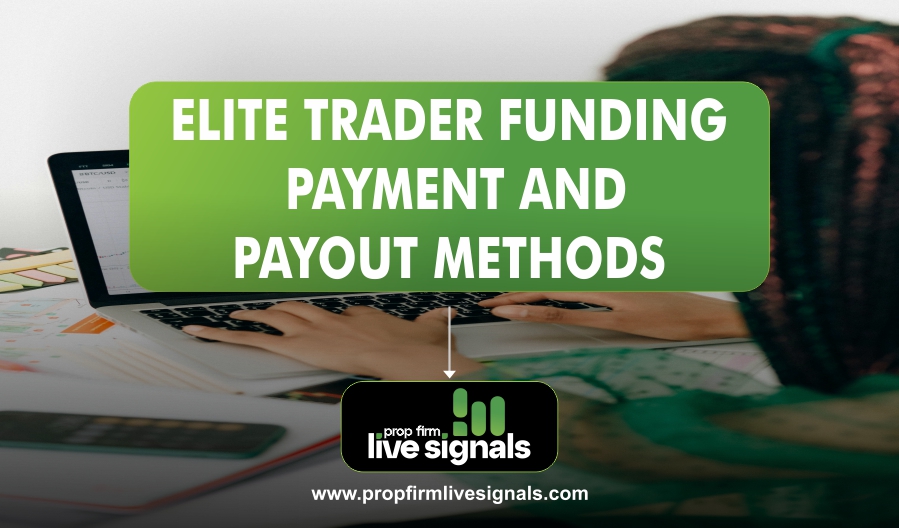What is Elite Traders Funding?
Elite Traders Funding (ETF) is a proprietary trading firm that funds skilled traders in exchange for a share of their profits. The main appeal of prop trading is that traders don’t need their own capital; the firm provides funding. This lets traders take larger positions and earn higher profits without the financial risk of personal trading.
ETF is part of a growing industry that connects skilled traders with the capital they need. Prop firms choose traders based on their strategies, risk management, and consistency. Once accepted, traders receive a funded account to trade.
Elite Trader Funding Payment Methods Process
When traders are accepted into Elite Traders Funding, they receive capital to trade. Once the trader has generated profits, the next step is understanding how payments and payouts occur.
Here’s how the payment process typically works with Elite Traders Funding:
- Profit Generation: After gaining access to the trading capital, the trader begins executing trades and generating profits.
- Profit Share Agreement: Elite Traders Funding has a profit-sharing model. The profit share percentage is generally agreed upon when the trader enters the program. First $12,500: 100% of profits go to you, After $12,500: 90% of profits go to you.
- Performance Monitoring: Elite Traders Funding, like most prop firms, monitors the performance of its traders continuously. Traders who are profitable consistently may see their profit split improve or be eligible for more capital to trade with. Conversely, traders who consistently lose money may face penalties, and their accounts may be suspended or terminated.
Elite Trader Funding Payment and Payout Methods
Elite Traders Funding provides several methods for traders to receive their payouts. These payment methods can vary by firm, but they typically include traditional and modern online payment methods.
1. Bank Transfers:
- Description: A standard method where the payment is directly deposited into the trader’s bank account.
- Pros: Secure, widely accepted, and easily traceable.
- Cons: Can take several business days to process, especially for international payments. Some banks charge transaction fees, particularly for international transfers.
2. Cryptocurrency:
- Description: Some prop firms, particularly those with a focus on innovation, offer cryptocurrency as a payment method. Popular cryptocurrencies like Bitcoin or Ethereum can be used for instant payouts.
- Pros: Fast processing times, lower fees, and greater privacy.
- Cons: Cryptocurrencies can be volatile, meaning the payout’s value can fluctuate based on market conditions. Not all traders are familiar or comfortable with cryptocurrencies.
3. E-wallets (Rise):
- Description: E-wallets are similar to PayPal, offering a convenient way to send and receive money online.
- Pros: Quick, easy, and many e-wallet services allow global transfers with relatively low fees.
- Cons: Like PayPal, there can be transaction fees, and some traders may not be familiar with certain e-wallet services.
Factors Influencing Payment and Payout Methods
Several factors can influence how Elite Traders Funding and other prop firms structure their payment and payout methods:
- Trader’s Performance: A trader’s profitability is the primary factor influencing their payouts. Consistently successful traders often get better profit splits or can scale up to larger accounts.
- Firm’s Risk Management: Firms that enforce strict risk management rules (like daily drawdown limits) may limit the frequency or amount of payouts to ensure stability.
- Payout Processing Times: While some firms may process payouts quickly (weekly or monthly), others may have a longer payout cycle depending on their internal systems or financial regulations.
- Payment Method Preferences: Different traders may prefer different methods (e.g., PayPal vs. cryptocurrency). Prop firms tend to accommodate various preferences, but some methods may incur additional fees or processing times.
Advantages of Prop Trading with Elite Traders Funding
Prop trading with Elite Traders Funding offers several advantages for skilled traders:
- Access to Capital: Traders can trade with larger amounts of capital than they would have on their own, increasing their earning potential.
- Profit Sharing: Traders can earn a percentage of the profits they generate, often between 90% and 100%, which is a highly attractive model.
- Risk Management Support: Traders can take on larger risks without worrying about losing personal funds, as the firm absorbs the losses.
- Scalability: As traders continue to perform well, they may be given larger accounts and the chance to scale up their trading activities.
Conclusion
Elite Traders Funding and other prop firms offer a unique opportunity for skilled traders to access significant amounts of capital without the risk of losing their personal funds. Understanding the payment and payout methods is essential for managing your trading career and ensuring timely access to your profits. By carefully following the firm’s rules and choosing the right payment methods, traders can maximize their earning potential while minimizing risk.
To take your trading career to the next level with Elite Traders Funding or a similar prop firm, understanding how payments and payouts work will prepare you for a successful journey.
Frequently Asked Questions (FAQ)
How often are payouts made? Payouts are typically made weekly or monthly, depending on the firm’s policies.
Do I need to repay losses? No, in most cases, traders are not required to repay losses. Prop firms absorb the losses, while traders keep a share of the profits.
What happens if I break a rule? Breaking a risk management rule can result in penalties or losing access to your funded account, depending on the severity of the violation.
How much capital will I start with? The amount of capital you are allocated depends on your performance during the evaluation and the firm’s terms. It can range from a few thousand dollars to significant sums for top-performing traders.
Can I use my own strategies? Yes, most prop firms allow traders to use their own strategies, as long as they comply with the firm’s risk management rules.




